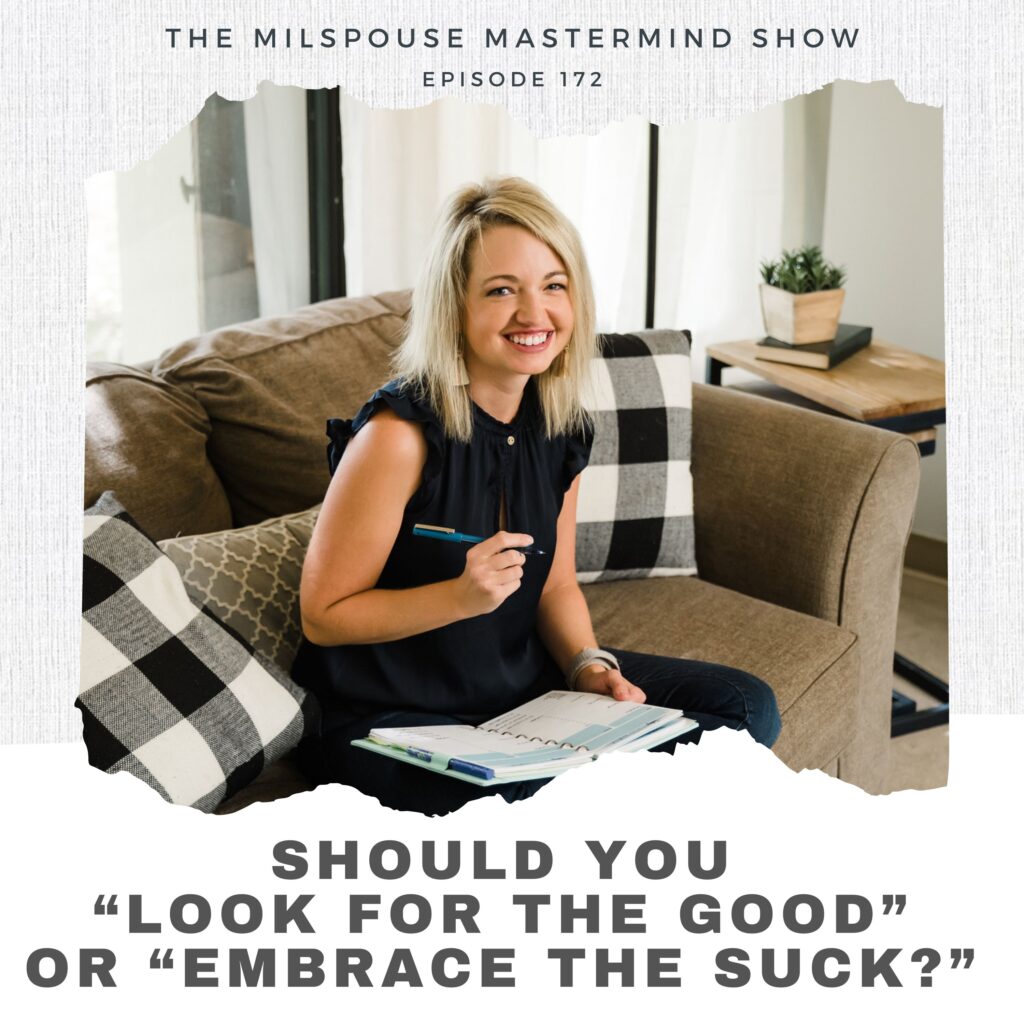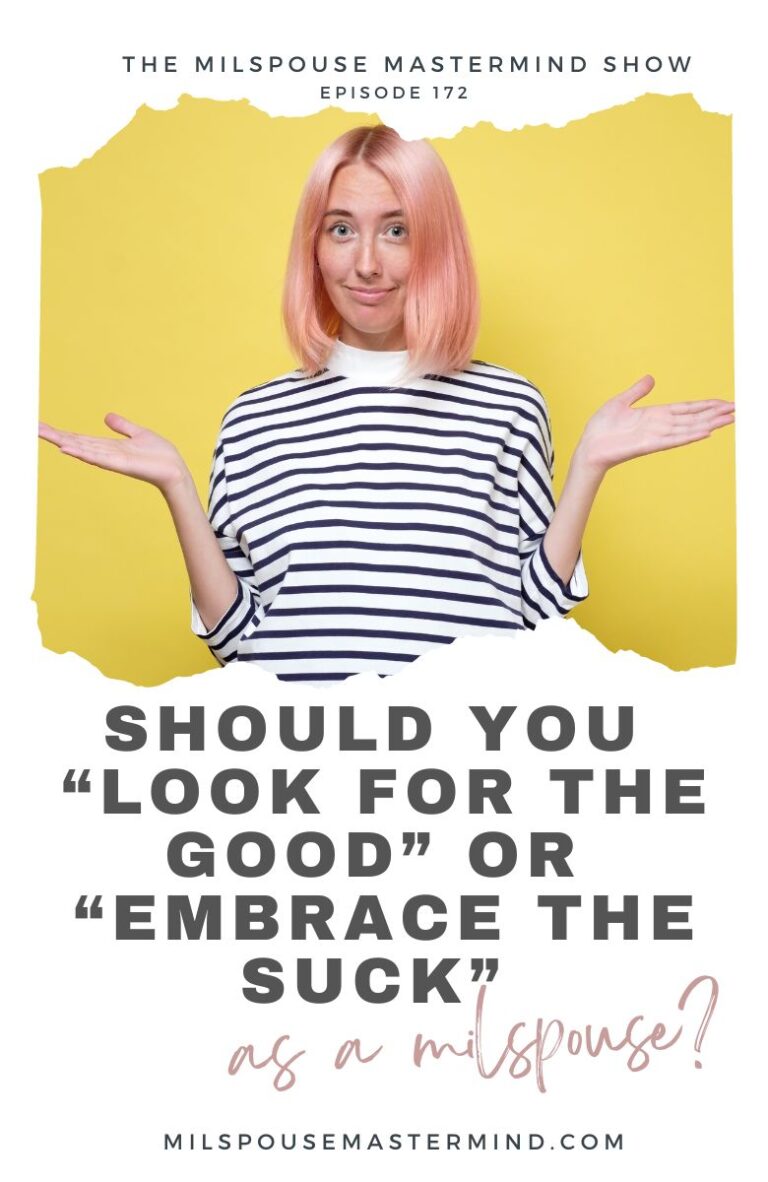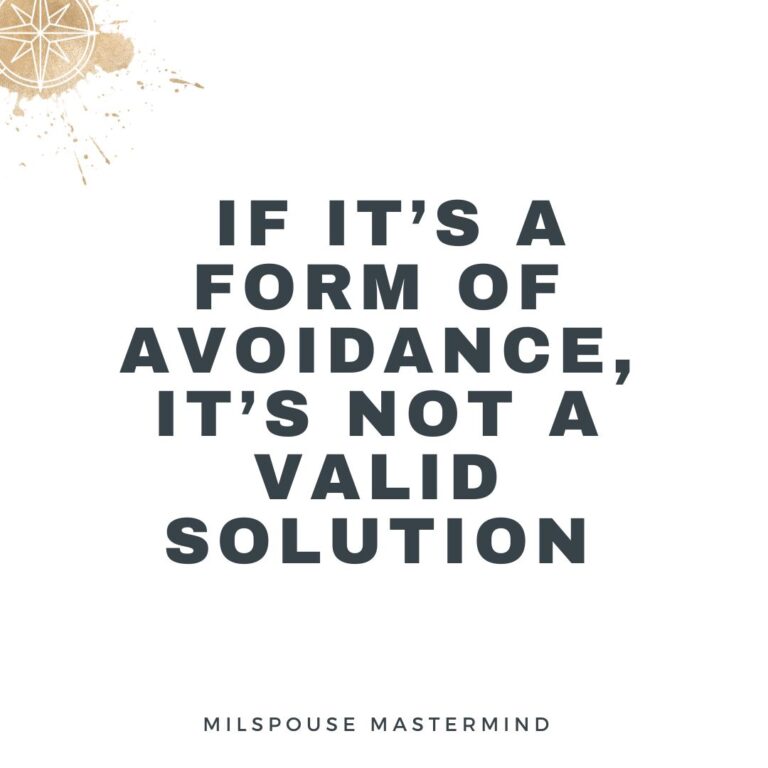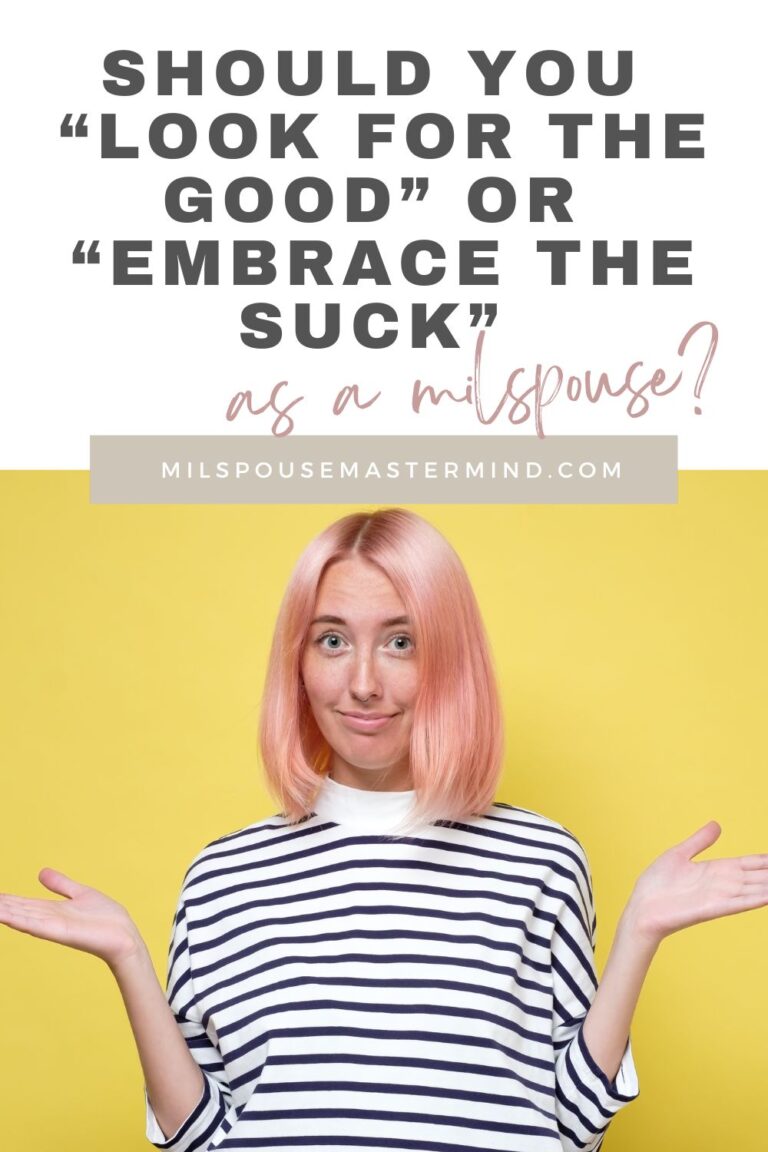
Sometimes life circumstances are difficult. But the real question is, what is the best way to respond to those circumstances?
Is it better to just “embrace the suck” or to “be more positive,” “look at the bright side,” and “look for the good”? Which approach will actually lead you to resilience, true emotional health, and to thriving despite the obstacles in your way? The answer might surprise you.

Start Here- Self Assessment: https://milspousemastermind.com/growthwheel
Clarity Workshop: https://milspousemastermind.com/workshop
Join the Community: https://milspousemastermind.com/community
What Matters Most Worksheet: https://milspousemastermind.com/values
Discover Purpose Course: https://morethanamilspouse.com
Leave a Show Review: https://milspousemastermind.com/show
Work With Me: milspousemastermind.com/unstuck

[00:00:00] Christine: Everywhere you look, you can find words of advice to help you navigate difficult situations in life. On the one hand, we hear, be more positive, look for the good, focus on your affirmations, find the silver lining. And then on the other hand, we hear, just embrace the suck, lean into the hard, it is what it is, sometimes life just sucks.
[00:00:22] So, which is correct? Today, we’re diving into the real questions you have about a positive outlook on life and navigating difficult circumstances as a military spouse. Ready for all the juicy goodness? Then let’s dive into the show.
[00:01:37] Did you know that it is impossible to show up as the healthiest version of yourself? Or as the spouse, the parent, the employee, the entrepreneur. that you want to be if you haven’t taken the time to get to know yourself and what really lights you up. Not what others want you to be or expect of you, but the most alive version of yourself and how to get there. This self-discovery process is so important to our health, to our well-being, and our ability to step into our true potential and craft a life with purpose.
[00:02:11] Because, friends, you have something that the world needs, and when you choose to tap into your full potential and craft a life with purpose, well, everybody better get ready. If you find yourself wondering what it is that really lights you up, that really brings you joy, that really makes you, you, If you find yourself questioning what you really want in life, or if you’re even living into your potential, then it might be time for a little self-discovery.
[00:02:46] The More Than a Milspouse Workshop is a free clarity training to get you started on this journey of awareness. In it, I walk you through practical exercises to help you reconnect with yourself and begin to look at life in a whole new light. If you are ready to begin the journey of transformation, Check it out by visiting milspouse mastermind. com slash workshop today and start discovering who you are meant to be.
Today I am so excited to dig into a topic that has very practical implications For us as military spouses, because on the show, we talk a lot about our mindset of being aware of our thoughts of focusing on the things that we can control and of shifting our thinking from why me to how can I be thankful today?
[00:03:44] What can I be grateful for? And in episode 165, I shared that the starting point to transforming Transcribed your life. The starting point to transforming my own life. The starting point to building our resilience toolkit. developing a gratitude practice. Looking for something that you can be thankful for.
[00:04:07] I tell this to my kids all the time. When you look for the good, you will find the good. And when you look for the bad, you will find the bad. So what are you looking for today? And all of that is absolutely true. But we can get ourselves in trouble. And this is what I have noticed over time, is that we get stuck in this either or mentality.
[00:04:35] This either or thinking that we either have to just focus on the positive or else we just embrace the suck. And so what I wanted to do today is kind of give us a better understanding of the value. that these two ideas bring and how they both come from a really good place, but there are problems when we take these ideas to the extreme.
[00:05:05] And so I want to unpack that with you today. The good that is in this thinking and what happens when that thinking is taken out of context or not used in the way that it was intended to be used. So, we can borrow from both of these concepts. Camps, if you will. These ideas, these mindsets, in order to develop a healthier mindset.
[00:05:33] In order to build our emotional health and resiliency and grow that resiliency toolkit. Now, if you have no idea what I’m talking about when I say resiliency toolkit, I want you to go back and listen to episode 163. If you’re not sure how to scroll back in your podcast player, I will have both of those episodes that I’ve talked about so far.
[00:05:55] Episode 165 on gratitude, and episode 163 on building your resilience toolkit. This is where we talked about, are you as resilient as you think? Because the answer might surprise you. So if you are brand new to this show, that is where I would suggest that you start. If you have already listened to those two episodes, then I really want us to get into this idea of a positive mindset and the idea of what it means to really embrace the suck.
[00:06:27] So let’s start with the power of positive thinking. We talk a lot about transforming our mindset on the show because when we are in a place where we view ourselves as a victim, we are looking at our life Through the lens of feeling powerless to change our circumstances We are dependent on others and what I always strive to do is to help you feel Empowered to know that while you may not be able to control what is happening You have so much power to control what you do with what you have.
[00:07:06] You can choose actions, attitudes, responses that are in alignment with how you want to show up in the world. You can choose to act in a way that aligns with your goals and your values. You are absolutely not powerless. And a lot of that thinking goes back to our mindset and what we are dwelling on and what we are believing to be true.
[00:07:33] Because our mind is such a powerful thing and what we do and how we act, and ultimately who we become starts with a thought in our mind and the thoughts that we think over and over again become the things that we believe and accept as truth. And those are the truths that we act on. And so there is so much power in changing the way that we think.
[00:08:00] And we build resilience by being able to shift the way that we view life. By reframing our circumstances as opportunities to grow. By developing a growth mindset. And when I talked about finding something that we can always be grateful for and focusing on those… Silver linings in episode 165, that goes a long way towards building our resilience.
[00:08:27] It is the foundation for our resilience toolkit and genuine positivity is powerful and builds resilience and positivity and focusing on the good, it’s contagious. Our positive outlook on life can actually make life better for those around us. Studies have shown that when we are positive and we are engaged in a conversation or even in the presence of other people, it can actually transform the energy in the room.
[00:09:03] It can help others become more positive as well. So there’s a lot of good that can come from focusing on the good and having that positive outlook on life, but positive thinking also has a dark side. And that is what is known as toxic positivity. And, and that’s what I want us to understand today, that there is a danger to positive thinking.
[00:09:32] And we have to be able to balance. The, the good of positive thinking with the need to acknowledge and accept that sometimes life is hard. Sometimes we do have negative emotions. Sometimes it just sucks that your partner is gone or deployed. That your PCS is rough. That you or someone you love has a job loss, uh, death in the family.
[00:10:03] A life altering diagnosis, and if we are just focused on trying to be positive and have a good attitude about and look for all the silver linings We’re actually not going to get to the place of true emotional health. And so while there might be a silver lining, because I do believe that good can come out of some really awful situations, and that we can find meaning in difficult situations, the, the, the thing to keep in mind is that if we try to suppress Our feelings.
[00:10:45] If we do not acknowledge the hurt, the anger, the fear, the worry, all of these emotions that are a natural part of… Being human, we actually hurt ourselves in the long run.
So, let’s talk about what toxic positivity is and why it’s such a problem. Toxic positivity is this pressure to be happy or to focus on the positive no matter what.
[00:11:19] At the expense of being honest about our real lives. It encourages us to deny any quote unquote negative emotions. And I say quote unquote because we have this idea that there’s positive emotions and that there’s negative emotions. And while they’re not touchy, feely, happy emotions, I… I hesitate to use the word negative because they are so valuable.
[00:11:49] And I don’t want to take away from the idea that just because they’re not a happy feeling, they’re not beneficial. Toxic positivity is when we just try to… Be more positive or, uh, ignore the problem. Because what we’re actually doing is ignoring the real issue. We’re burying our emotions. We’re trying to either pretend that they don’t exist or that they don’t exist.
[00:12:19] impact us. And the best example that I can think of at the moment is if you have seen the Lego movie. And the character in there is the Lego Unikitty. And she is always the picture of happiness and positivity and always looking for that silver lining and As the situation gets more and more tense and fraught, she’s trying so hard to just be positive, and finally she can’t hold it in anymore, and she transforms into Mega Rage Unikitty.
[00:12:58] And it’s just a funny part of the movie, but it gives the example of the more that we try to pack those negative emotions down, the more that we try to bury what we’re really feeling, it’s a problem. And… Because it’s, number one, it is getting stored in our body, whether we realize it or not. And that builds up over time until we explode.
[00:13:23] The painful parts of our life that we try to ignore don’t just go away. And so why is toxic positivity a problem? I think it’s a problem. Because we do this so naturally, without thinking sometimes. We, and I’m guilty of this just as much as anyone else. We tell our kids, don’t worry about it. It’s going to be fine.
[00:13:52] Don’t, don’t think about it. You don’t have to feel that way. Or we tell our partner. Look at the bright side. We, we tell a friend that’s going through a tough situation. Oh, you know, it’s not the end of the world. We tell them, Oh, but this thing can be good. And when we try to help others look for the good in the midst of a difficult situation, we mean well when we do it.
[00:14:17] And I think this is just something that culturally we have learned to try to encourage, to try to make others feel better. So we actually do this without thinking, but we in some senses, um, don’t allow them to express their true emotions and feelings about that situation. And so when we say something like, Oh, look at the bright side.
[00:14:43] You don’t need to worry about this. It’s all going to be okay. It actually shuts down or suppresses real feelings. Or it makes us not a safe person that they can share what’s going on with. It encourages them to hide their real authentic selves. Or we will sometimes do this to ourself and we will… Encourage ourself to bury that emotion, but when we do this it isolates us from people and The biggest thing to remember is that as I said before we need our negative emotions So, what do we do about those emotions, and how do we balance that need for positive thinking and the power that that brings to us with all of these feelings and emotions about a difficult situation?
[00:15:38] So, let’s shift gears for a minute and talk about the term embracing the suck. It’s a term that might be more familiar to us, uh, because we’re in the military. I was curious where it actually came from, and it looks like it was originally popularized by the Marines, but it’s the idea that we just keep going, even in the midst of hardship or tough situations.
[00:16:07] And I think sometimes it’s used to say, well, we just need to accept that life goes on. Sucks. We’re just gonna grin and bear it and life sucks, and it is what it is, right? But that’s not the full picture of what embracing the suck is really meant to be. It starts from an important piece and that is validating the suck, but if we just leave it as Validating the suck, it doesn’t give us anywhere to move towards, to be able to move through the situation.
[00:16:41] What embracing the suck is really all about is developing resilience and understanding that we can’t control a lot of things. But we can control our response and we can choose to reframe the situation, to learn from and grow through the situation. Truly becoming someone who is emotionally healthy involves understanding that emotions are are very real sensations in our body.
[00:17:14] And they are very important because they give us awareness. And so having the awareness of what sensations, what emotions and feelings we are having, accepting, letting them pass through our body, and letting us deal with the emotion, allows us to then reframe And move forward with a positive mindset. And so that is the biggest piece that is missing in toxic positivity.
[00:17:49] We never learn what to do with those feelings, those emotions, those sensations. We have to actually address them rather than trying to suppress or ignore them. Because our body, whether we realize it or not, is holding on to it. So what we’re really after when we say embracing the suck, when we talk about making the most of our mindset, is we really want to develop emotional regulation, emotional resilience.
[00:18:23] There’s all these terms out there. Emotional intelligence, psychological flexibility. But they all point to the same thing, that we are able to address painful thoughts, feelings. That we are able to make our way through difficult situations and still take action. That aligns with our values so that we ultimately live a rich and meaningful life.
[00:18:53] life. So both of these ideas of thinking positively, of the power of our mindset, of being positive, and embracing the suck are important parts to developing emotional health and resilience. When taken to extreme, they can be problematic because we have to be able to deal with those emotions and move forward.
[00:19:26] So, let me quickly get into three things that we can do to help us embrace the set, to help us tap into our full potential, to help us develop that resilience and those emotional regulation skills. Three things that all of us can begin to do. We’ve talked about these on the show before, but three things that I want you to keep in mind as we wrap up today.
[00:19:56] Number one is mindfulness. Creating the awareness of what’s going on and making room for our feelings and sensations so that we can relate to them. In a new way. I was actually doing a headspace meditation this morning, and I loved the definition that he gave of mindfulness. It was being more present in what we’re doing and more connected to the world around us.
[00:20:27] And when we are able to be more present in what we’re doing, when we are more connected, we are able to process through and act in a way that aligns with our values.
The second piece is getting clarity around what is meaningful to us, what we stand for, what, who we want to be, what our core values are.
[00:20:51] And then the third piece of that is just the action, that we choose responses and live according to our values in Even in difficult situations. Those are the pieces that allow us to show up as a healthy version of ourselves, even in the midst of difficult situations. So, here’s how we’re going to wrap this up today.
[00:21:16] Number one, if you are lacking clarity around who you are, what’s most important to you, I have free tools for you. Obviously, I would love for you to start with our values worksheet, which is linked below in the show notes. Um, but like I said at the top of the episode, we have a free clarity workshop that you can go through.
[00:21:39] We have a free life assessment sheet that tells you which areas of life you are struggling with, but it’s all tools to help you get the clarity around who you are and who you want to be so that you can take actions that align with that. The second piece is we’re going to do another deep dive into mindfulness because I have a few more ideas that I really want to unpack with you and one particular practice that has been so helpful to me in my own life and so I think it will be really helpful to you because I always want to take it away from just a concept and bring it down and show you what this looks like.
[00:22:25] in practice so that you can make it a part of your life and that you can transform your life.
So, yes, there is power in positive thinking, but there is also a danger to just thinking more positively. And there is so much value in embracing the suck. But if we just sit in the suck and we don’t move through it, and take actions that align with who we want to be, then we’re not going to show up as the healthiest version of ourselves.
[00:22:58] Developing emotional health and resilience requires us to accept what has happened, to be aware of what we’re feeling, and to… Process those emotions in a healthy way and then be able to move forward to create a life that aligns with What we value and who we want to be and how we want to show up in the world So I hope this helped answer some questions for you.
[00:23:24] If you still have questions on embracing the suck on positive thinking and Toxic positivity. I would love for you to come and pop inside our free Facebook community, ask those questions. Let’s dive into this conversation a little bit deeper so that we can grow together. I will meet you back here next week for that deep dive into a mindfulness practice that has been hugely helpful in my life. Until then, may you live filled, fueled, and full of joy.

Join the MilSpouse Mastermind Facebook Community!
MILSPOUSE MASTERMIND
© 2023 MILSPOUSE MASTERMIND | ALL RIGHTS RESERVED | TERMS & CONDITIONS | PRIVACY POLICY | CONTACT
Milspouse Purpose Playbook is your step-by-step guide to discovering your identity and purpose. It will help you identify WHO you really are, WHAT you want, and HOW to sustainably set and pursue goals as a military spouse (without burning yourself out in the process).
Get early access to podcasts, exclusive freebies & practical tips to help you thrive as a military spouse, discover what lights you up, and live a life of purpose.